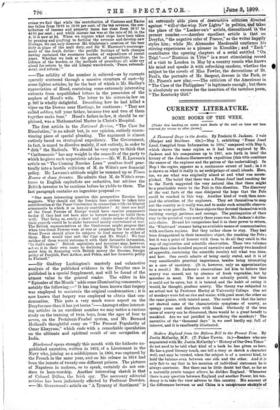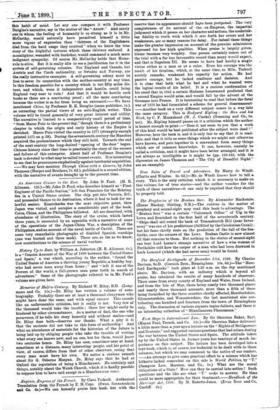Modern England from the Reform Bill to the Present Time.
By Justin McCarthy, M.P. ('I'. Fisher Unwin. 5s.)—Readers who are acquainted with Mr. Justin McCarthy's " History of Our Own Tifues " do not need to be told what kind of a book he has given us here. He has a good literary touch, can tell a story or sketch a character Well, and may be trusted, when the subject is of a neutral kind, to hold the balance even between one side and the other. Audit is only fair to say that in his mention of individual statesmen he is always courteous. But there can be little doubt but that, as far as a naturally gentle temper allows, he dislikes England. "Whisnever there is any question between England and another Power, his ten- dency is to take the view adverse to this country. His account of the differences between us and China IS a conspicuous etaiiiple of this habit of mind. Let any one cotapare it with Professor Dearglas's narrative, say in'the matter of the " Arrow." Aid surely one in whom the feeling of humanity is so strong as it is in Mr. McCarthy, would naturally have permitted himself a little more vigour of expression than " thirteen of the Englishmen died from-the hard usage they received " when we know the true story of the frightful tortures which these thirteen endured. A moonlighter, wounded with buckshot, would command a much more indignant sympathy. Of course Mr. McCarthy holds that Home- rule is alive. But it is really idle to see a justification for it in the system of self-governing colonies. Not England and Canada, but Austria and the Czech nationality, or Sweden aid Norway, are the really instructive examples. A self-governing colony must be free to sever its connection with the mother-country at any time. Is this freedom possible for a country which is but fifty miles dis- tant, and which, were it independent and hostile, could bring England very near to ruin ? And that it would be hostile such books as these are a convincing proof ; all the more convincing because the writer is so far from being an extremist.—We have mentioned China, by Professor R. K. Douglas (same publisher, 5s.), as correcting the partial views of an anti-English writer. This volume will be found generally of very great interest and utility.. The narrative is limited to a comparatively small period of time, " from Marco Polo to the present day," though there is a preliminary chapter in which the origin and early history of the Empire is sketched. Marco Polo visited the country in 1271 (strangely enough printed 1571 on p.29). During the seventeenth century the Manchus acquired the predominance which they still hold. Towards the end of the next century the long-desired "opening of the door" began. Chinese history since that time is practically the story of the success and failure of this enterprise. About half of Professor Douglas's book is devoted to what may be called recent events. It is interesting to see that he pronounces emphatically against territorial acquisition. —We may here mention Thrcrugh China with a Camera, by John Thomson (Harper and Brothers, 7s. Gd.), published in a second edition, with the narrative of events brought up to the present, time.







































 Previous page
Previous page